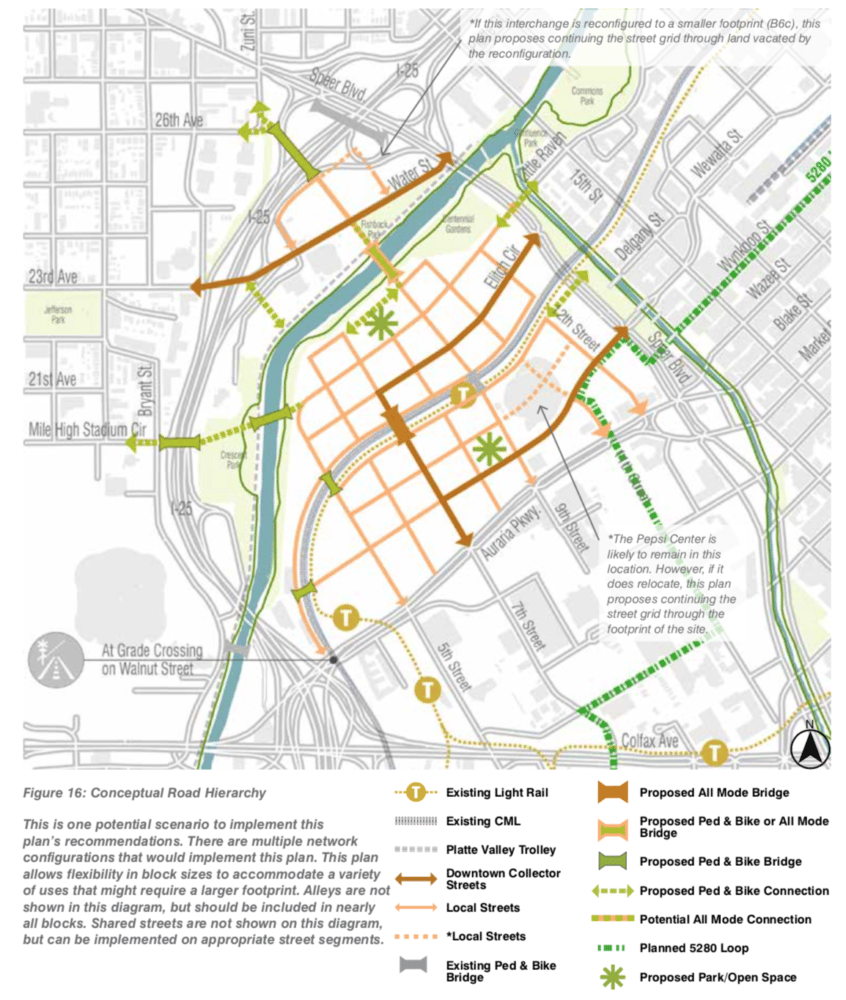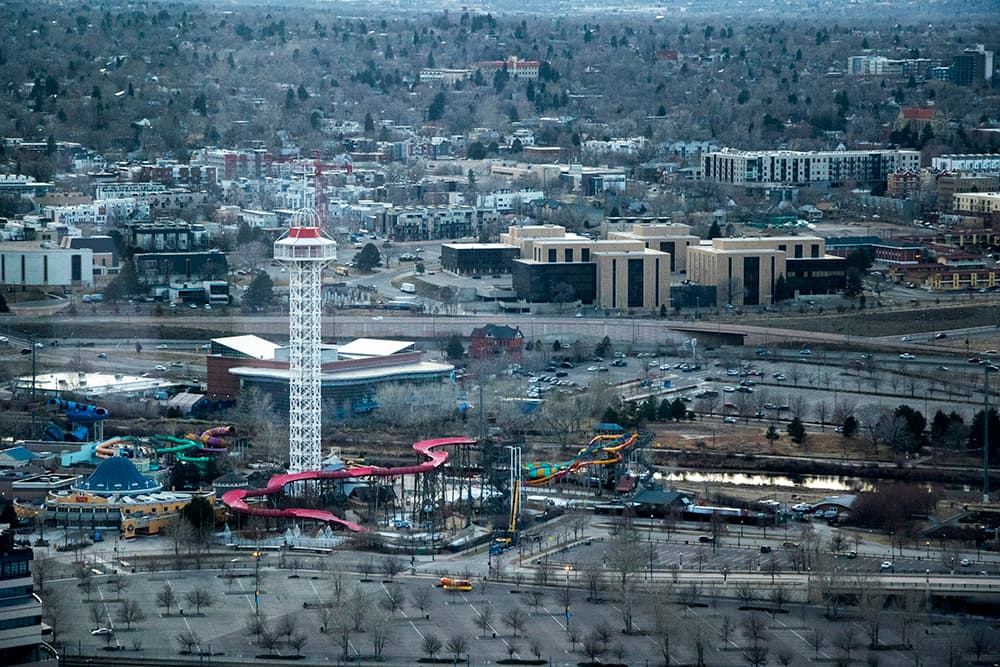This year, the owners of Elitch Gardens finally confirmed that they are interested in redeveloping the amusement park near downtown Denver.
They laid out a vision of thousands of new apartment units and condos in skyscrapers along the South Platte River. Eventually, that plan could see Elitch's moved to another location.
That plan is years from reality -- but it gained an important endorsement on Monday as the Denver City Council discussed the broad idea of a new urban center near downtown, including the tough questions of flooding, affordability and the future of Elitch Gardens.
Ultimately, they approved an overall plan for the area in an 11-0 vote.
Here's what they actually did.
The city's leaders approved a new area plan. Basically, it's a broad set of ideals and ideas for the area between Interstate 25, Auraria Parkway and Speer Boulevard.
Those borders surround not just Elitch's but also the Pepsi Center and a whole lot of parking, plus a couple rail stations, and the plan covers a period of up to 20 years.
The new plan is not set in stone, but it sets the path for the city's planners and leaders in the decades ahead -- especially as developer Rhys Duggan works on his own plans for the amusement park area.
Duggan could bring skyscrapers and thousands of people, though that could take decades.

Among other recommendations, the new plan suggests:
- New public spaces, plus a mix of building sizes and land uses
- A revitalized riverfront, with public access and activity along the South Platte
- A focus on transit, with parking maximums that limit the number of spots, rather than parking minimums
- Improved connections to neighboring areas, potentially including new pedestrian/bike bridges over the river and I-25, plus new bike/pedestrian infrastructure for the East 37th Avenue bridge over I-25
“The plan is not committing to these things, it’s saying we need these things and that we have to figure out a way to get these things,” said Steve Nalley, a neighborhood planning supervisor, in a previous interview.

The plan also emphasizes the idea of economic diversity. It suggests that the city will encourage developers to build units with lower rents and price points within the neighborhood.
One strategy could be to allow developers to build larger buildings if they include lower-cost housing -- similar to its approach near 38th and Blake. Duggan also has said he wants to bring workforce housing to his potential development.
"I think you’ll be pleasantly surprised by what we bring forward," he said. "I think we’ll go well above and beyond what’s been done in the city previously."
What did council say?
Councilman Kevin Flynn asked about the fate of historic buildings on the north side of the Auraria campus.
The plan suggests that there could be height limits to discourage super-charged development in that area, according to city staff.
Councilwoman Debbie Ortega asked whether it was wise to concentrate density near rail lines, given that freight trains transport hazardous materials. It would be key to create a buffer zone, she said.
Ortega also asked for more details about how much parkland would be included in the area. City staff said they hoped to add park space , especially along the river.
Ortega questioned, too, whether flooding would be a threat, given the disastrous history of the South Platte. City staff said they were looking at ways to make the area more resilient against flooding, and that improvements within the river also could reduce the threat.
And Duggan said that he had been working with regional flooding planners. "We've taken that on, as part of our challenge, to expedite that and to implement that regional solution," he said.
Councilwoman At-large Robin Kniech asked how the plan would define low-income when it discusses affordable housing.
Planner Abe Barge acknowledged that it doesn't yet set specific levels. Kniech suggested that the site could need a specific affordable housing plan. She also asked whether the city would work to ensure that spaces are "really created" around families, rather than simply providing three-bedroom units.
Duggan said that he was dedicated to a "complete city," including daycares and schools. And he argued that this site is a prime place to accomplish that. Because he and others own large parcels, they'll have more ability to make it happen, he said.
"It creates the ability to deliver a lot of elements of the plan a lot more easily than if the ownership were fractured," Duggan said.
Ortega asked whether the area could handle the stresses of development at Elitch's, along with neighboring plans for Sun Valley and the Mile High area. She asked if anyone was looking at "long-term viability... so we're not just jamming everything wherever we can build, just for the sake of seeing more people coming to our city."
Finally, Kniech asked how Duggan and the city would embrace and encourage racial diversity in the area, given downtown's heavily white and affluent population -- a concern that Councilman Rafael Espinoza shared.
"I'm open to ideas on that, for sure," Duggan said.
He cited his company's upcoming work with Meow Wolf, the arts group that will occupy a building on his company's property, as an example of a strategy for inclusivity. Meow Wolf is making a broad-ranging effort to connect with Denver's arts community, he said.
Council President Albus Brooks stressed that this is a high-level plan, and he espoused the plan. He stressed the fact that the plan includes limits on parking, and that it connects a sizable new chunk of land to the city's transit network.
"It's going to be a long process, where we all get to be a part of it," Brooks said. He said it could be one of the most sustainable and eco-friendly areas of the city and one of its "most impressive multi-modal areas," and that it would have one of the highest requirements for below-market housing in the city.
Kniech described it as "a really great plan in all of the areas that it covers," but she said it could have "ripple" effects, potentially displacing residents of Denver.
And she called on the city to have a specific plan to counteract those ripples, saying that the city had previously been "transactional" on the topic. Councilman Paul López, meanwhile, said that he was concerned by the loss of jobs and recreation at Elitch's, though he praised the overall plan.
"I really hope to see a truly diverse downtown with (income) levels all over the map," said Councilman Paul Kashmann.
And Ortega said that she hoped that by funneling high-density development into a central site, the city could head off growing anger.
"If we can keep the density downtown, hopefully we don't have density overtaking our neighborhoods," she said. "We'll hear this very loud and clear in this next election cycle — neighborhoods fighting to protect their residential community."
Councilwoman Mary Beth Susman was optimistic about the plan, while Councilwoman Stacie Gilmore said she hoped the neighborhood would be inclusive, where people "take ownership and they put down roots," including resources that help people improve their lives. Councilman Jolon Clark said he was particularly excited about the open-space plans.
What's next?
The Elitch's redevelopment plan would require a rezoning to be approved by the council. That request could be submitted within the next six months, Brooks said.
And the devil, Brooks warned, would be in the details. Espinoza, meanwhile, expressed concerns that the rezoning could arrive so quickly.
If development is approved, Duggan has said it would begin on the parking lots on the east side of the amusement park.
"I think a 20-year horizon is probably accurate," he said. "At the Elitch’s site, we’ve committed to keep the (amusement park) there for the foreseeable future."
Councilman Kevin Flynn pushed for more detail. Duggan, the land owner, said that he and his partner are "quite committed ... to looking at a relocation plan."
Duggan said that a modern amusement park takes 120 acres, and he acknowledged that could be quite difficult to find in metro Denver.
Meanwhile, it could take years for the city to start some of the infrastructure projects -- such as bridges and bike lanes -- that are included in this area plan.
By the way: The plan does not anticipate that the Pepsi Center will be going anywhere. But it does discuss the idea of more intense development on the parking lots currently surrounding the arena.











